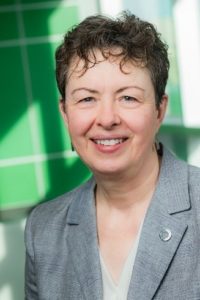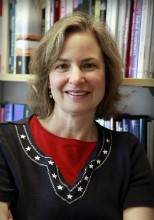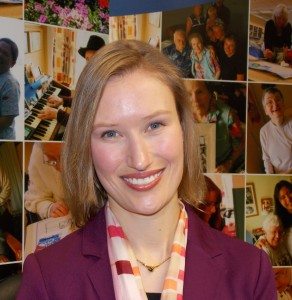Among the plenaries for this year’s 40th annual conference, will be a discussion on the latest and ongoing research that is critical in the training and education of health care providers. “The 3Rs – Research, Recruitment and Retention: Exploring the role of post-secondary institutions in BC’s continuing care sector” is a plenary session that will discuss how post-secondary institutions research are advancing the goals of the continuing care sector, and how academia can play a role in shaping the future of seniors’ care.
This session will be moderated by Jennifer Lyle, Executive Director of SafeCare BC. The following esteemed speakers make up the panel:
- Dr. Carole Estabrooks, Professor, Faculty of Nursing, at the University of Alberta, Principal investigator (PI) of TREC
- Dr. Judith Lynam, Director of the Masters of Health Leadership and Policy in Seniors Care at University of British Columbia
- Dr. Kelli Stajduhar, Professor, Institute on Aging and Lifelong Health and School of Nursing, University of Victoria
- Dr. Andrew Sixsmith, Professor and Director of the Gerontology Research Centre at Simon Fraser University
Post-secondary institutions play an important role in ensuring that a sufficiently trained workforce will meet the needs of an aging population. They also have an duty to develop evidence-based research to improve quality of care and facilitate reforms to the overall health system.
“We are at a point now where I think we require much more partnership, collaboration, and reciprocal input to ensure that post-secondary institutions are developing programs that are relevant to meet the changing needs of continuing care, but also to ensure that research that is proposed can inform and guide our work going forward,” says Dr. Stajduhar.
Stronger collaboration between post-secondary institutions, the Ministry of Health, and health authorities will help health care providers with recruitment and retention of care workers.
“One approach to improving the quality of care is to educate leaders who have not only knowledge of how to effectively lead and manage teams and attain standards of quality, but also to educate leaders about the needs of seniors in a range of community and care contexts, as well as acquire insights from different disciplines in order to put in place practices that foster health and well-being,” says Dr. Lynam.
Evidence-based research practices are created from the collaborations that will help improve the continuing care sector in the country. “We have high needs for evidence informed practice and policy in LTC. The population in LTC will continue to increase in complexity, dependency, and frailty driven in no small part by the high needs to later stage older adults with dementia,” argues Dr. Estabrooks.
According to Dr. Lynam, post-secondary institutions such as the University of British Columbia, have established exciting developments that will benefit the continuing care sector.
“Researchers are seeking to understand how to best understand and address some of the most challenging situations associated with the care of seniors. We need to identify the best practices and policy conditions that enable us to foster optimal health of seniors,” she explains.
Lyle says that attendees can expect an inspiring dialogue around the intersection of research and technology applied to the continuing care sector in this plenary.
“This session will discuss how Canada’s post-secondary institutions are working with key stakeholders in the sector to translate these exciting advances into tangible, real-life applications,” she says.
Register now to attend western Canada’s largest conference on the continuing care sector, and attend our plenary sessions which will focus on all aspects of seniors care.
Stay tuned for more profiles of our 40th annual conference plenary speakers.
Meet the plenary speakers:
Dr. Carole Estabrooks

Dr. Carole Estabrooks has been a member of the faculty and principal investigator of the Knowledge Utilization Studies Program since 1997. She holds a Tier I Canada Research Chair (2005-2018) in Knowledge Translation. She is cross appointed in the School of Public Health. Dr. Estabrooks supervises undergraduate and graduate students and postdoctoral fellows and teaches in the areas of knowledge translation and research design. Her research focuses on basic and applied aspects of inquiry in the knowledge translation and knowledge utilization fields. She has been the recipient of several awards and achievements among them, the Betty Havens Prize for Knowledge Translation in Aging (2014), the CAFA Distinguished Academic Award (2010), the Alumni Award of Distinction, University of New Brunswick (2007), the Alumni Horizon Award (2002), and career scientist awards from CIHR/MRC (Health Scholar, 2000-2005) and AHFMR (Population Health Investigator, 2000-2003). In 2007, Dr. Estabrooks was elected to Fellowship in the Canadian Academy of Health Sciences (FCAHS). In 2011, she was inducted as a Fellow into the American Academy of Nurses (FAAN). She is a past member and Vice-Chair of the CIHR Institute of Aging.
Dr. Judith Lynam

Dr. Judith Lynam has an overriding interest in understanding the conditions that contribute to inequities in health and in exploring ways these can be addressed through practice and education. Over the past two decades she has worked in partnership with community-based organizations and health professionals in an effort to make health care more responsive to the needs of different groups within communities. Most recently, she has been instrumental in introducing social pediatrics as a solution to meet the health needs of Vancouver’s most vulnerable children. She has worked in partnership with community groups and colleagues in medicine, nursing and health care https://bccare.ca/wp-content/uploads/2022/08/medcare-img22.jpgistration to research the RICHER practice initiative. Insights on system transformation from this research have been drawn upon to inform the design of the new MHLP degree in Seniors Care. Dr. Lynam has held a number of leadership positions in national and provincial organizations concerned with professional education and practice.
Dr. Kelli Stajduhar

Dr. Kelli Stajduhar has worked in oncology, palliative care, and gerontology for almost 30 years as a staff nurse, nurse clinician, clinical nurse specialist, educator, and researcher. Her clinical work and research has focused on health service needs for those at the end-of-life and their families and on the needs of marginalized and vulnerable populations. Dr. Stajduhar is Principal Investigator of iPANEL, a nursing health services research initiative on integrating a palliative approach to care across the health care continuum. She currently leads an international research collaborative on family caregiving involving researchers from the United Kingdom and Australia. She is the recipient of several awards: 2010 Anselm Strauss Award from the U.S. National Council on Family Relations in recognition of her outstanding contribution to family research, 2014 Excellence in Nursing Research award from the College of Registered Nurses of BC, 2015 Craigdarroch Award for Excellence in Knowledge Mobilization from the University of Victoria, and 2016 Award of Excellence in Nursing Research from the Canadian Association of Schools of Nursing. She has held career scientist awards from CIHR and MSFHR (2005-2010) and in 2017 was honoured with CAFA-BC Distinguished Academic Award.
Dr. Andrew Sixsmith

Dr. Andrew Sixsmith is Professor and Director of the STAR Institute at Simon Fraser University in Vancouver, BC, and is Scientific Director of AGE-WELL Network of Centres of Excellence. He has been researching in the field of technology and aging since the 1990s in Europe and Canada. The federally-funded AGE-WELL NCE Inc., aims to harness the potential of information and communication technologies to benefit seniors. Dr Sixsmith’s particular role is to exploit research outcomes and drive innovation, build capacity within the research and commercial communities and to make Canada a world leader in the technology and aging sector. He was President of the International Society of Gerontechnology 2014-2016.
Plenary moderator:
Jennifer Lyle

Jennifer Lyle is the Executive Director of the provincial long term care health and safety association, SafeCare BC. Prior to coming on board with SafeCare BC, she worked in a dual role as a healthcare practitioner and the Director of Operations for a Burnaby-based rehabilitation organization after graduating from Simon Fraser University with a Bachelor of Science degree. She later obtained her Master of Health Administration at the University of British Columbia.
In addition to her studies, Lyle has collaborated on research initiatives exploring the impact of care environments on elderly patients and care providers. She also sits on the board of directors for the British Columbia Association of Kinesiologists.
She is a strong advocate of a holistic approach to healthcare, and believes that creating positive, healthy environments for both providers and clients is key to effective, quality care. Out of the office, you can find Jennifer hiking and mountaineering in the backcountry.




